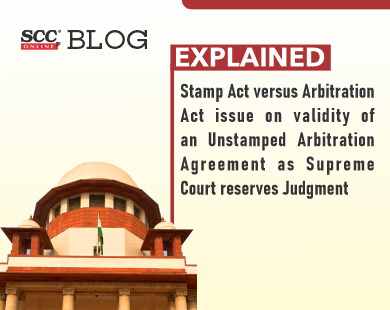Supreme Court: The Constitution Bench comprising of K.M. Joseph, Ajay Rastogi, Aniruddha Bose, Hrishikesh Roy and C.T. Ravikumar, JJ., reserved a judgment pertaining to an appeal against a full bench judgment primarily challenging the non-admissibility of an unstamped arbitration agreement and judicial Court’s intervention in matters of arbitration.
The appellants alleged that, while deciding the case of N.N. Global Mercantile Pvt. Ltd. v. Indo Unique Flame Ltd., (2021) 4 SCC 379, the bench grossly erred in their observation: “We have carefully perused the provisions of the Maharashtra Stamp Act, 1958 and Schedule I appended thereto, which enlists the instruments specified in Section 3, on which stamp duty is chargeable. We find that an arbitration agreement is not included in the Schedule as an instrument chargeable to stamp duty.”
The appellants challenged the scope of applicability of Section 33 and 35 of the Stamp Act, 1899 (‘Stamp Act’), in respect of an application under Section 11 of the Arbitration and Conciliation Act, 1966 (‘Arbitration Act’) which states the appointment of an Arbitrator.
They contended that if the scope of examination of the existence of the arbitration agreement was widened to include examination of whether the instrument was duly stamped, such interpretation, apart from being contrary to the plain language of Section 11(6A) of the Arbitration Act, wholly defeated the legislative intention of the Arbitration and Conciliation (Amendment) Act, 2015, and puts a spoke in the wheel of conduct of the arbitration process at its very inception.
The appellants asserted that the 2015 Amendment Act was introduced to emphasise the speedy disposal of cases relating to arbitration with least court interference. After the amendment, all that the Courts needed to see was whether an arbitration agreement existed. The legislative policy and purpose were essentially to minimise the Court’s intervention at the stage of appointing the arbitrator.
It was alleged that the Stamp Act was a fiscal measure enacted to secure revenue of the State and not to arm a litigant with a weapon of technicality. Failure to stamp a document which was needed to be stamped under the provisions of the Stamp Act did not affect the validity of the transaction embodied in the document but merely rendered the document inadmissible in evidence.
Appellants submitted that the adjudication of stamp duty is a time-consuming process that does not naturally align with the stated goal of the Arbitration Act to ensure expeditious appointment of arbitrators. It was further argued that compelling the judge under Section 11 to adjudicate stamp duty would be to encourage parasitical challenges and dilatory tactics in resisting reference to arbitration.
The appellants navigated through various relevant provisions of the Stamp Act including Sections 3, 33 to 48, Article 5 of Schedule 1, case laws by Privy Council, several High Courts and even Supreme Court of Pakistan related to the admissibility of an unstamped instrument being defective and not invalid.
The appellants while referring to Garware Wall Ropes Ltd. v. Coastal Marine Constructions and Engineering Limited, (2019) 9 SCC 209, also alluded to Sections 2(3), 5, 7, 8, 11, 16, 34 and 45 of the Arbitration Act, 246th Law Commission Report, Supreme Court cases, to sum up the difference between ‘inadmissibility’ and ‘invalidity’ for an existing arbitration agreement.
The Amicus Curiae in the present matter asserted on the scope of examination of the existence of the arbitration agreement through Section 11(6A) of the Arbitration Act, recommendations of 246th Law Commission, Sections 33 and 35 of the Stamp Act.
[N.N. Global Mercantile Pvt. Ltd. v. Indo Unique Flame Ltd., Civil Appeal No. 3802-3803 of 2020, Judgment reserved on 25-01-2023]
Advocates who appeared in this case:
Amicus Curiae: Senior Advocate Gourab Banerjee;
For Appellant: Advocate Gagan Sanghi and Advocate on Record Rameshwar Prasad Goyal;
For Respondents: Senior Advocate K. Ramakanth Reddy, Advocate Rajul Shrivastav, Advocate Mohit D. Ram, Advocate Monish Handa, Advocate on Record Charu Ambwani, Advocate Raghu Gurram, Advocate Kavya Vijay, Advocate Komal Agarwal, Advocate on Record Sanjay Kapur, Advocate Megha Karnwal, Advocate Surya Prakash, Advocate Arjun Bhatia, Advocate Akshata Joshi, Advocate Astha Gumber, Advocate on Record Debesh Panda, Advocate Naman Maheshwari, Advocate Garv Malhotra, Advocate Neil Chatterjee, Advocate Udbhav Gady, Advocate Snehal Maheshwari Rahul Totala, Advocate Eshan Aprameya Chaturvedi, Senior Advocate Malvika Trivedi, Advocate Premlal Krishnan, Advocate Rahul Arya, Advocate Madhav Bhatia, Advocate Bani Dixit, Advocate Yogesh Sharma, Advocate Shailendra Slaria, Advocate Arun Pandian, Advocate Shreshth Arya, Advocate Aditya Pandey, Advocate Himanshu Kapoor, Advocate on Record Alok Tripathi, Advocate Sujal Gupta, Advocate on Record Puneet Singh Bindra, Advocate Anshika Mishra, Advocate Simran Jeet, and Advocate Rishabh Gupta.







